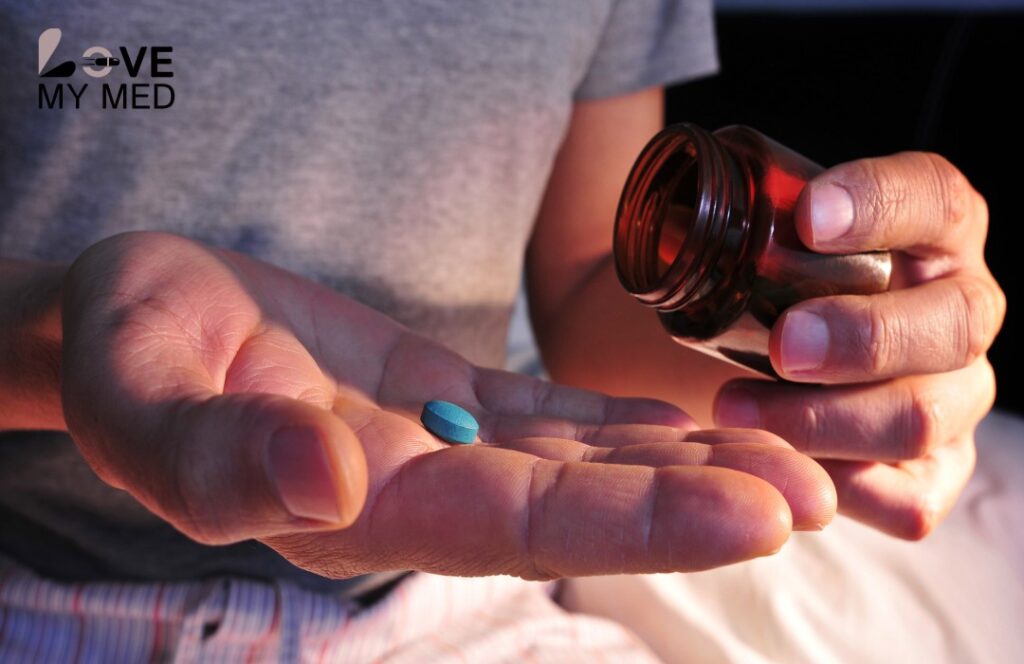A Guide to Sildenafil Dosage for Treating Erectile Dysfunction
What is Sildenafil?
Sildenafil (Viagra) is a medication used mostly for treating erectile dysfunction. It assists in increasing blood flow to the penis, allowing men to achieve and sustain an erection during sexual intercourse. Moreover, sildenafil belongs to the group of medicines called phosphodiesterase type 5 inhibitors (PDE5 inhibitors). It was first introduced in the market in 1998 and quickly became a popular treatment for ED.
Key Takeaways
- The standard starting dose of sildenafil for erectile dysfunction (ED) is 50 mg, taken as needed about 30 minutes to 1 hour before sexual activity; your doctor may adjust this between 25 mg and 100 mg based on efficacy and tolerability.
- The maximum recommended ED dose is 100 mg once per day to balance effectiveness with safety.
- Lower doses (25 mg) are advised for older adults (65+) or those with kidney, liver issues, or interacting medications, reducing the risk of side effects.
- Sildenafil typically works within 30 minutes, with action lasting up to 4 hours—and some may start feeling effects in as little as 12–15 minutes.
- Adjustments may be needed based on renal or hepatic impairment, age, and interactions with drugs like alpha blockers or strong CYP3A4 inhibitors; always follow your healthcare provider’s guidance.
Understanding Erectile Dysfunction (ED)
Erectile dysfunction (or impotence) is a very common condition where a man suffers from an inability to achieve and or maintain an erection that is adequate for sexual intercourse. While occasional issues with erections are normal, persistent problems may indicate an underlying health condition like heart disease, diabetes, or stress.
According to studies, ED impacts several million men all over the world. Over 30 million men in the U.S. alone suffer from the condition, according to the American Urological Association. Moreover, this condition can result from several factors such as age, lifestyle, psychological condition, and other medical problems.
Why Sildenafil is Effective for ED Treatment
Sildenafil has proven to be effective because it enhances the effectiveness of nitric oxide, which is a natural compound the body produces. This assists with the body’s ability to relax the muscles within the penis. Increased blood flow is essential in achieving an erection, therefore, without proper blood flow, it becomes increasingly more difficult. Overcoming this challenge is made easier by responding to sexual stimulation thanks to sildenafil.
ED (Erectile Dysfunction) is linked to impaired blood flow, which is the root cause. Therefore, for men who struggle with achieving or maintaining an erection, sildenafil offers relief to enjoy a satisfying sexual experience.
Sildenafil Dosage Recommendations
-
Starting Dose
In the majority of cases, 50 mg is considered the best initial dose of sildenafil for erectile dysfunction. For other men. This medication needs to be consumed roughly 1 hour before engaging in sexual activity. In the case of having sex, the medication works best when not eating. Being on an empty stomach accelerates its onset of action. Taking it with food is an option, but it can take longer to work.
Most men have found this dosage useful. However, individual responses may vary, which is normal. It’s important to your doctor using the provided guidance to receive suitable results.
-
Adjusting the Dose
Your doctor may adjust the dosage if it did not yield the expected outcomes or if you experienced some adverse effects. Based on your feedback, the dosage will either be raised to 100mg or lowered to 25mg. Such guarantees that the medication provided will be useful and tolerable.
It is essential to highlight that sildenafil, as one example, should never be taken in quantities exceeding one prescribed dose in 24 hours. Lacking such guidance may lead to dire consequences, thus, intervention should not be sought without consultation.
-
Maximum Dosage
Sildenafil, just to mention one example, has an upper threshold of 100mg. One should keep in mind, however, that exceeding this quantity would not bring any added benefits, but may also increase the risk of complications. Such parameters should be kept for all associated guidance provided by one’s health practitioner. If, however, these have not been effective as prescribed, one would do best to further consult before any such initiatives.
Sildenafil Dosing Overview
| Patient Profile | Recommended Dose | Timing & Notes |
| General adult | Start at 50 mg | 30 min–1 hour before sex; max 100 mg per day |
| Older adults (65+) / health conditions | 25 mg (lower starting dose) | Safer in those with renal/hepatic impairment or on interacting meds |
| Food impact | On empty stomach preferred | High-fat meals may slow absorption |
| Onset & duration | Onset in 30 min; lasts ~4 hours | Some may notice effects within 12–15 min |
| Adjustments needed for interactions | Varies—follow doctor’s advice | Important when combining with certain medications |
How to take Sildenafil effectively?
-
Timing Your Dose
When using sildenafil, proper timing will maximize benefits. While sexual activity can happen up to 4 hours after taking the drug, Viagra works best when taken 1 hour prior. This helps to reach the desired outcome when needed.
Make sure to plan to avoid the last-minute rush. Although effective for 4 hours, one should not take more than one dose in 24 hours.
-
Taking Sildenafil with or Without Food
Sildenafil can be consumed with or without food, but there’s a caveat. Taking the drug while fasting enhances its speed. Meals, especially those high in fat, tend to delay absorption and may prolong the time the medication takes to kick in.
If a meal is scheduled after taking the dose, it is fine, but the onset will not be immediate. For best outcomes, the medication should be taken on an empty stomach.
-
Alcohol and Grapefruit Juice Interactions
Sildenafil dosage recommends avoiding alcoholic beverages, as alcohol intake may increase the dizziness and headache side effects of this medication.
With the same logic, grapefruit juice must also be avoided as it may inhibit the metaphase enzymes responsible for the breakdown of sildenafil within the body, leading to increased as well as prolonged side effects with prolonged use.
Potential Side Effects
While sildenafil is generally safe for most men, like any medication, it may cause side effects in some individuals.
Common side effects include:
- Nausea, vomiting, and headaches
- Flushing (of the skin)
- Difficulty digesting food (indigestion)
- Blocked nasal cavity (congestion) of the lungs and nose)
- Dizziness
- Disturbance in vision, such as seeing through a blue or green-tinted lens.
As stated before, these side effects may be mild and temporary, meaning your system would be able to tolerate them for a few days. These bothersome effects would require consulting with a physician, should they persist or worsen over time.
Serious Side Effects
Sildenafil can, on occasion, lead to more severe consequences. These may comprise:
- Priapism: A medical condition characterized by an erection lasting longer than four hours. This should be treated as an emergency, as you may endure long-term consequences to your penile tissue if you do not seek appropriate medical care quickly.
- Sudden vision loss: Vision impairment in one or both eyes suddenly occurring is an uncommon but grave side effect that could indicate a critical problem such as NAION (non-arteritic anterior ischemic optic neuropathy).
- Hearing loss: Some men who undergo this condition suddenly lose or reduce their hearing ability and may experience tinnitus.
In the event of these rare life-threatening events, patients are advised to discontinue the use of sildenafil and seek medical assistance without delay.
Drug Interactions
Here are a few medications that are known to interfere with Sildenafil:
- It must not be taken concurrently with Nitrates Medication.
- Other drugs include some antibiotics and antifungals.
- Alpha-blockers are used to treat hypertension.
- HIV/AIDS drugs, protease inhibitors
These include medications that can cause severe hypotension or increase bleeding risk and hence must be avoided. Adjusting seams is necessary, and hence your doctor could help, considering all of these situations somebody may have, suggest alternative options.
Special Populations and Sildenafil Use
-
Elderly Patients
Elderly patients have their unique challenges with every problem. Getting older is associated with Changes in several Critical factors, and blood pressure control is severely affected.
The effects of drugs change with aging. Sildenafil in elderly patients can prove to be more effective than intended, due to the level of men’s metabolism. Recommending lower values, for Example of 25mg can only benefit instead. Constant examination is a major part of determining quality of life. And those who have high BP or Cardiovascular problems need their health constantly evaluated.
-
Renal and Hepatic Impairment
Kidney or liver conditions in men may require changes to their sildenafil dose. Sildenafil is metabolized in the liver and eliminated via the kidneys; thus, those with reduced functioning in either organ should be watched very closely. Dosing intervals or medication strength may need to be lowered to avoid the side effects that arise from the medication accumulating in the body.
In case you have a history of liver conditions like cirrhosis or kidney ailments, it is essential to notify your physician so that the appropriate adjustments can be made to the treatment plan.
Contraindications
Not everyone can take sildenafil. It should not be taken by people who:
- Nitrates are taken for chest pain or heart-related issues due to the dangerous fall in blood pressure that can accompany this combination.
- Have had severe heart or liver conditions in the past.
- Have an allergic reaction to sildenafil or any component of the medication.
Prior to initiating sildenafil, your doctor will evaluate your medical history and current medications. A healthy overall workup will mean no concerns to treat and thus, uninterrupted treatment. Follow all directions given by your physician, and ensure you provide a complete medical history.
FAQs
1. How long does sildenafil take to work?
Sildenafil is likely to start working within half to one hour, although it may take as long as 2 hours in some cases. Timing can be impacted by your eating habits, health status, and other considerations. For optimal results, try taking it on an empty stomach.
2. How long do the effects of sildenafil last?
Separately for each person, how long the effects of sildenafil last varies, but it can be up to four hours. Remember, there has to be sexual stimulation for sildenafil to work because it will not induce an erection by itself.
3. Can I take sildenafil with other ED treatments?
Simultaneous use of sildenafil and other erectile dysfunction drugs should be avoided, especially with other PDE5 inhibitors like tadalafil and vardenafil. Doing so can result in dangerously low blood pressure. Be sure to consult your medical practitioner before using different treatment options together.
4. Is it safe to take sildenafil daily?
Sildenafil is meant to be taken on an as-needed basis, meaning it’s not designed for everyday use. That said, some physicians may prescribe a lower daily dose for sustained treatment. This is based on your medical history and particular requirements. Never change the amount taken or how often it is taken without discussing it with your doctor.
6. What should I do if I miss a dose?
Because sildenafil is typically only taken as needed, the likelihood of skipping one is low. With that said, if you’re on a regimen that requires dosing and you happen to skip one, remember to take it right after you remember. If it is near your dosing interval, do not take the missed dose—never, under any circumstances, attempt to take multiple doses simultaneously.





